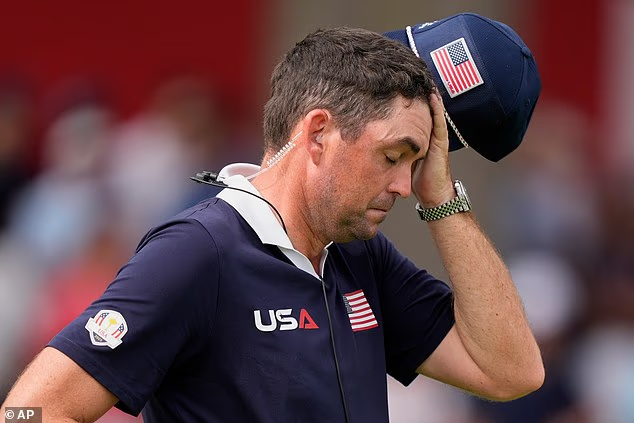The 2023 Ryder Cup: A Captaincy in Crisis
The Ryder Cup is one of golf’s most prestigious and eagerly anticipated tournaments, drawing global attention as the finest players from Europe and America go head-to-head in a battle for pride and legacy. As the dust settles on the 2023 event at Bethpage Black, American captain Keegan Bradley finds himself under intense scrutiny for his leadership decisions, reminiscent of a notorious chapter in Ryder Cup history: Hal Sutton’s captaincy in 2004.
A Historical Comparison: Hal Sutton’s Legacy
At the 2004 Ryder Cup, Hal Sutton made headlines for all the wrong reasons, beginning with his humorous but cringe-worthy gaffe during the Opening Ceremony when he forgot one of his children while thanking his family. The incident quickly became emblematic of his troubled captaincy, culminating in a staggering 18.5 to 9.5 defeat. Fast forward to 2023, and Bradley appears to be on a path towards a similar ignominious fate, as his decisions come under fire from fans and analysts alike.
Leadership Challenges: The Dilemma of Pairings
The crux of Bradley’s woes lies in his pairing choices for the competition. His decision to team up Collin Morikawa and Harris English—a combination widely labeled as the worst American foursomes duo by DataGolf—proved to be disastrous. The duo was soundly defeated 5&4 by Rory McIlroy and Tommy Fleetwood, setting a disheartening tone for the rest of the tournament. Despite ample warning from analytics, Bradley doubled down on this pairing without considering their individual capabilities and team dynamics.
Crippling Misjudgments: Ignoring Expert Analysis
The fallout from Bradley’s decisions has not been limited to poor performances on the course. Expert publications like Golf Digest pointed out the glaring flaws in choosing Morikawa and English. With Morikawa struggling with form and English lacking experience in the alternate-shot format, many questioned Bradley’s strategy. This was a prime example of how overlooking data and expert advice can lead to catastrophic results in high-stakes competitions like the Ryder Cup.
A Crowning Blunder: The Flag Incident
In a bid to rally the crowd, Bradley went to spectacular lengths that many deemed "bizarre." He sprinted down the 18th fairway waving an American flag, attempting to ignite enthusiasm among fans. Instead of creating an uplifting atmosphere, this act drew criticism and even exacerbated tensions among the players, particularly those facing a barrage of abuse from the crowd. Leadership often requires a balance of tactics, and this incident highlighted Bradley’s struggles to find that balance.
Reevaluating Strategy: A Captainly Conundrum
Despite the evident failures, Bradley showed stubbornness in sticking to his guns. The decision to re-pair Morikawa and English brought only more heartache, as they once again faced McIlroy and Fleetwood and were defeated, this time 3&2. Repeating a pairing that had already proven unsuccessful left spectators questioning Bradley’s strategy. There’s a fine line between confidence and recklessness in leadership, and Bradley’s approach risked crossing that line, leading to a palpable sense of frustration.
The European Advantage: A Compare-and-Contrast
While Bradley stumbles from one misstep to the next, European captain Luke Donald demonstrates the stark contrast in effective leadership. Donald’s meticulous preparation has optimized the performance of his top players, including McIlroy, whose leadership skills have shone through amidst external pressures. The European team’s cohesive strategy has yielded a commanding performance against a fragmented American team, underscoring the importance of thorough planning and adaptive strategies in competitive environments.
The Ghost of Past Leaders: Learning from Mistakes
As Bradley grapples with the weight of history, it’s essential to recognize the lessons to be learned from previous Ryder Cup captains. Sutton’s captaincy was criticized not just for poor pairings but for ineffective communication and leadership clarity. These elements continue to resonate in Bradley’s struggles, as the lack of a clear game plan hampers team morale and performance.
A Teetering Outcome: The Pressure of Expectations
With Bradley’s captaincy faltering, the situation has reached a critical point. Stars like Scottie Scheffler, who entered the tournament as the world number one, experienced a disheartening performance, losing every match he played prior to Saturday’s fourballs. The pressure to perform, coupled with Bradley’s questionable decisions, has created a climate of anxiety and frustration within the team. How Bradley navigates this toxic environment could redefine his legacy—not just at this Ryder Cup, but for all future American golf leadership.
A Call to Action: Seeking Redemption
As the team faces potential humiliation, a pathway for Bradley’s redemption could involve a reflective approach. Acknowledging mistakes, apologizing to teammates and opposition alike, and recalibrating strategies should be at the forefront of his efforts. Instead of wallowing in despair, proactive steps toward rebuilding team unity and confidence can serve as a foundation for future success, both for Bradley and American golf as a whole.
Conclusion: The Future of Ryder Cup Leadership
The challenges faced by Keegan Bradley during the 2023 Ryder Cup at Bethpage Black are a stark reminder of the intricacies involved in leading a team at this level of competition. As history has shown us, both triumphs and tribulations can define a captain’s legacy. Whether Bradley can regroup and take actionable steps toward alleviating the current crisis remains to be seen. The lessons learned from his experience may serve future American captains well, ensuring that they are better prepared for the immense responsibility of leading their teams on one of golf’s grandest stages.
By focusing on collaboration, adaptability, and strategic intelligence, the Ryder Cup can continue to inspire future generations of players and fans alike, emphasizing the enduring spirit of competition and camaraderie that defines this celebration of golf.
